
Transport and Telecommunication Journal
Scope & Guideline
Empowering Global Transport and Telecommunication Research
Introduction
Aims and Scopes
- Transport System Optimization:
Research in this area focuses on the development and application of algorithms and methodologies for optimizing transportation systems, including routing, scheduling, and resource allocation. - Telecommunication Technologies in Transport:
This scope involves the exploration of how telecommunications technologies, such as IoT, 5G, and blockchain, can enhance transport systems, improve communication, and ensure data security. - Sustainable and Green Transport Solutions:
The journal emphasizes studies that propose sustainable practices in transport, including electric vehicles, carbon-neutral operations, and efficient logistics, contributing to environmental sustainability. - Safety and Risk Management in Transportation:
Research focusing on safety measures, risk assessment, and management strategies within various transport modalities, aiming to improve safety standards and reduce accidents. - Innovative Transport Infrastructure:
This area covers advancements in transport infrastructure, including the design and implementation of smart transport systems, tunnels, bridges, and urban mobility solutions. - Data Analytics and Intelligent Systems:
The application of data analytics, machine learning, and AI to improve transport operations, enhance decision-making processes, and predict transport trends.
Trending and Emerging
- Integration of AI and Machine Learning:
There is a growing trend towards integrating AI and machine learning in transport systems for predictive analytics, traffic management, and enhancing user experiences. - Blockchain Technology in Transport:
Research on blockchain applications for security and efficiency in transport logistics and telecommunication networks is gaining traction, addressing concerns about data integrity and transparency. - Sustainable Transport Innovations:
An increasing focus on sustainable transport solutions, including electric and autonomous vehicles, reflects global efforts to reduce carbon emissions and promote eco-friendly practices. - Smart Infrastructure Development:
Emerging studies are concentrating on the design and implementation of smart infrastructure that leverages IoT and real-time data to improve transport efficiency and safety. - Transport Data Analytics and Visualization:
The use of advanced data analytics and visualization techniques to interpret transport data is trending, providing valuable insights for decision-makers and stakeholders. - Resilience and Adaptation Strategies:
Research addressing the resilience of transport systems to climate change and other disruptions is becoming more prominent, reflecting the need for adaptive strategies in infrastructure planning.
Declining or Waning
- Traditional Traffic Management Techniques:
Interest in conventional traffic management methods has diminished as new technologies and intelligent systems emerge, leading to a preference for data-driven and AI-based approaches. - Aviation-Specific Studies:
The focus on aviation transport has decreased, possibly due to the global challenges faced by the aviation industry, including the impact of the COVID-19 pandemic and a shift towards more integrated transport solutions. - Static Infrastructure Analysis:
Research concentrating solely on static transport infrastructure has waned, with a growing emphasis on dynamic systems that incorporate real-time data and adaptive management. - Manual Data Collection Methods:
There is a noticeable decline in studies utilizing manual data collection techniques, as automated and sensor-based data collection methods become more prevalent and efficient. - Single-Mode Transport Studies:
Research focusing exclusively on single modes of transport (e.g., road, rail, air) is less common, with a shift towards integrated multimodal transport solutions that consider the entire transport ecosystem.
Similar Journals
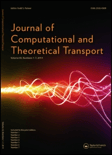
Journal of Computational and Theoretical Transport
Exploring Innovative Solutions in Transport PhenomenaJournal of Computational and Theoretical Transport, published by Taylor & Francis Inc, is a dedicated platform for researchers and professionals in the fields of applied mathematics, mathematical physics, and transportation. Since its inception in 2013, this journal has offered valuable insights into computational and theoretical approaches to transport phenomena, bridging various scientific disciplines and fostering interdisciplinary collaborations. While the journal currently holds a Q4 ranking in categories such as Applied Mathematics and Statistical and Nonlinear Physics, it aims to elevate the quality of research published in these areas through rigorous peer review and a commitment to advancing knowledge. The university-sponsored studies, which cover a wide spectrum of transport models and their applications, make it a vital resource for students and academics alike. Positioned within the United Kingdom, this journal continues to attract a global readership interested in the latest developments and theoretical advancements in transportation science. With no open access option, readers can expect high-quality, curated content that reflects ongoing research trends and methodologies, contributing to the broader field of physics and engineering.

European Journal of Transport and Infrastructure Research
Driving evidence-based decisions in transport and infrastructure.The European Journal of Transport and Infrastructure Research (EJTIR) is a premier academic journal dedicated to advancing the field of transport and infrastructure studies. Established in 2000 and published by the EDITORIAL BOARD EJTIR in the Netherlands, this open-access journal promotes the dissemination of high-quality research through a global platform. With an impressive categorization in the Q2 quartile for Geography, Planning, and Development, as well as Urban Studies, and a Q3 ranking in Transportation as of 2023, EJTIR is recognized for its significant contributions to these vital disciplines. It holds commendable Scopus rankings, reflecting its impact and relevance in the social sciences. The journal's objectives include fostering innovative research, facilitating a dialogue among scholars, practitioners, and policymakers, and addressing contemporary transportation challenges. The open access model ensures that research findings are accessible to a wider audience, thereby promoting evidence-based decision-making in transport policies and infrastructure development. Researchers, professionals, and students are encouraged to engage with the journal's content, contributing to the ongoing discourse in this essential field.

Case Studies on Transport Policy
Unveiling the dynamics of transport systems through rigorous analysis.Case Studies on Transport Policy, published by Elsevier, is an influential journal in the fields of transport policy, urban studies, and geographic planning. With its ISSN 2213-624X and E-ISSN 2213-6258, this quarterly journal has consistently maintained a strong impact within its scope, attaining Q1 rankings in Geography, Planning and Development and Urban Studies, as well as a Q2 ranking in Transportation for 2023. The journal provides a platform for high-quality research and practical case studies that contribute significantly to the understanding and improvement of transport systems and policies worldwide. Its rigorous peer-review process ensures that published articles are of the highest academic standard, appealing to researchers, policy-makers, and professionals alike. With a strong presence in several social sciences categories, the journal ranks highly in Scopus, positioning itself as a critical resource for those engaged in the strategic development and analysis of transport solutions. Located in Amsterdam, Netherlands, it aims to bridge the gap between research and real-world applications, facilitating knowledge exchange and innovative strategies in transport policy.

Maritime Transport Research
Pioneering Insights into the Dynamics of Maritime TransportMaritime Transport Research is a cutting-edge journal dedicated to advancing knowledge and innovation within the field of maritime transport. Published by ELSEVIER, this Open Access journal has been active since 2020, providing researchers, professionals, and students with free and unrestricted access to high-quality research content. With an impressive impact factor and categorized in the Q2 quartile for the field of Transportation, this journal ranks #50 out of 141 in Scopus' Social Sciences _ Transportation category, placing it in the 64th percentile among its peers. Maritime Transport Research aims to foster interdisciplinary dialogue and promote scholarly advancements by publishing original research, reviews, and case studies that address the complexities and dynamics of maritime logistics, policy, and technology. Located in the United Kingdom, this journal is a vital resource for anyone engaged in maritime studies, highlighting its commitment to supporting the academic community through rigorous and impactful research.
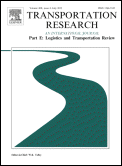
TRANSPORTATION RESEARCH PART E-LOGISTICS AND TRANSPORTATION REVIEW
Connecting Research and Practice in Transportation EfficiencyTRANSPORTATION RESEARCH PART E-LOGISTICS AND TRANSPORTATION REVIEW, published by PERGAMON-ELSEVIER SCIENCE LTD in the United Kingdom, is a leading academic journal that focuses on the complementary fields of logistics and transportation. Since its inception in 1997, this journal has been instrumental in shaping the discourse around various facets of transportation systems, supply chain optimization, and logistical efficiency. With an impressive 2023 impact factor and a prestigious ranking, classified as Q1 in key categories such as Business and International Management, Civil and Structural Engineering, and Management Science and Operations Research, it stands at the forefront of research in its domain. The journal is committed to disseminating high-quality research and offers open access options to enhance the visibility and impact of its articles. As it converges its content through 2024, it continues to provide invaluable insights to a diverse audience of researchers, practitioners, and students who are keen on advancing knowledge and practices in transportation and logistics.
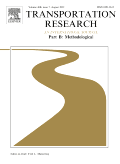
TRANSPORTATION RESEARCH PART B-METHODOLOGICAL
Transforming challenges into solutions in transportation research.TRANSPORTATION RESEARCH PART B - METHODOLOGICAL is a premier academic journal published by Pergamon-Elsevier Science Ltd, focusing on innovative methodologies and solutions in the field of transportation research. With a prestigious Q1 ranking in key categories, including Civil and Structural Engineering, Management Science and Operations Research, and Transportation, the journal demonstrates its vital role in advancing the academic discourse and practical applications within these domains. Boasting an impressive Scopus ranking of #20 in Civil and Structural Engineering and #15 in Transportation, it attracts high-quality research that informs policy, enhances transport systems, and contributes to sustainable development. The journal serves as a critical platform for researchers, practitioners, and students alike to disseminate findings that push the boundaries of transportation science. With a publication history dating from 1979 to 2024, TRANSPORTATION RESEARCH PART B is dedicated to fostering interdisciplinary collaborations and inspiring new methodologies to tackle complex transportation challenges. As a vital resource for the academic community, it leverages a broad international perspective to enrich the field and facilitate cutting-edge research.
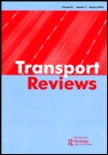
TRANSPORT REVIEWS
Bridging Theory and Practice in TransportationTRANSPORT REVIEWS, a prestigious journal published by Taylor & Francis Ltd, is a leading platform for the dissemination of cutting-edge research in the field of transportation. With an ISSN of 0144-1647 and an E-ISSN of 1464-5327, the journal has established itself as an essential resource for academic and professional communities worldwide. Renowned for its high impact, TRANSPORT REVIEWS proudly holds a Q1 category ranking in Transportation for 2023 and is rated 6th out of 141 in Social Sciences Transportation on Scopus, placing it in the 96th percentile—a testament to its influence and relevance within the discipline. The journal covers a broad spectrum of topics related to transportation, making it invaluable for researchers, policymakers, and practitioners alike. While it currently does not offer open access, its commitment to high-quality peer-reviewed content ensures that the latest innovations and insights are readily available to advance the field. Published from 1981 to 2024, TRANSPORT REVIEWS continues to shape the future of transportation science and engineering through its rigorous exploration of theoretical and practical issues.

European Transport Research Review
Pioneering Insights for a Sustainable Transport FutureEuropean Transport Research Review is a prestigious academic journal published by Springer, focusing on cutting-edge research in the fields of automotive engineering, mechanical engineering, and transportation. Since its transition to an Open Access model in 2009, the journal has significantly contributed to the dissemination of knowledge, allowing unexplored insights to reach a global audience. Based in Germany, this journal stands out with its high impact factor and impressive Scopus rankings; it holds a Q1 status in both the Automotive and Mechanical Engineering categories, reflecting its prominence in academic and professional circles. With a commitment to advancing the frontiers of transport research, the European Transport Research Review serves as an essential resource for researchers, professionals, and students seeking to stay abreast of the latest developments and innovations in these critical sectors. Given its extensive reach and robust editorial guidelines, the journal attracts a diverse range of submissions that explore the multifaceted dynamics of transport systems across Europe and beyond.
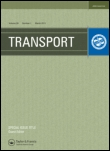
Transport
Championing open access in transport research and innovation.Transport is a leading open-access journal published by VILNIUS GEDIMINAS TECH UNIVERSITY, specializing in the fields of automotive and mechanical engineering. Since its transition to open access in 2018, the journal has become a vital platform for disseminating high-quality research and innovative practices in transport systems, engineering technologies, and sustainable mobility solutions. With an ISSN of 1648-4142 and an E-ISSN of 1648-3480, Transport is indexed in Scopus with notable rankings, including Q2 in Automotive Engineering and Q3 in Mechanical Engineering for 2023, reflecting its influential presence within these disciplines. Researchers and practitioners are encouraged to contribute to this scholarly community, where their work will reach a robust international audience, thereby advancing knowledge and fostering collaborations in the ever-evolving transport sector. Based in Lithuania, the journal is committed to maintaining rigorous peer-review standards and promoting interdisciplinary studies to address the complex challenges in transportation engineering.

IEEE Open Journal of Intelligent Transportation Systems
Pioneering Solutions for Modern Mobility Challenges.IEEE Open Journal of Intelligent Transportation Systems, published by the IEEE-INST ELECTRICAL ELECTRONICS ENGINEERS INC, stands at the forefront of innovation in the realm of intelligent transportation systems since its inception in 2020. With its open-access format, this journal aims to disseminate groundbreaking research and technology advancements to a broader audience, fostering collaboration and knowledge exchange among professionals in the automotive, mechanical, and computer science engineering sectors. It boasts impressive Q1 rankings in Automotive Engineering, Computer Science Applications, and Mechanical Engineering as of 2023, highlighting its critical role in shaping the future of transportation technologies. The journal's exceptional standing is further evidenced by its Scopus rankings; it holds the 76th percentile in Mechanical Engineering and the 74th percentile in Automotive Engineering, making it a premier outlet for cutting-edge research. Researchers, professionals, and students seeking to navigate the evolving challenges and solutions in intelligent transportation systems will find this journal an invaluable resource.